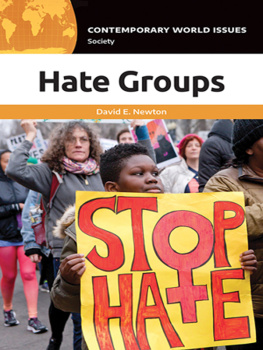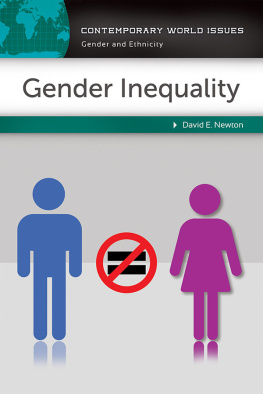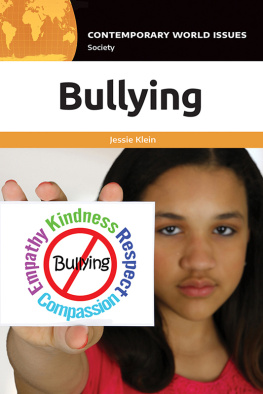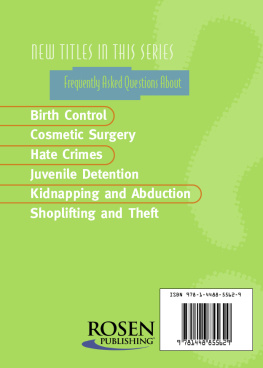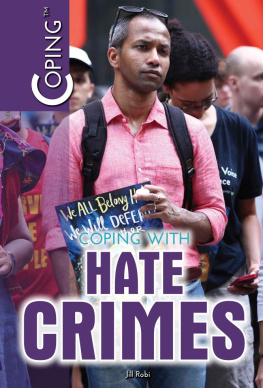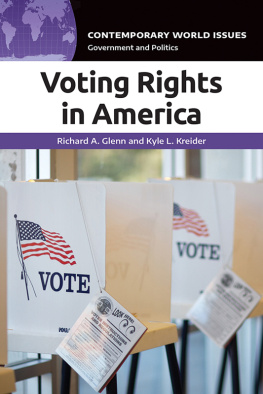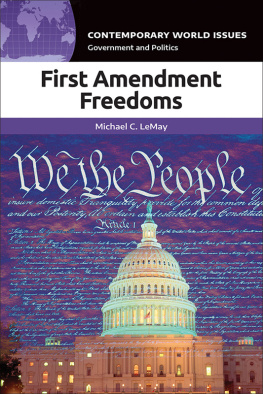Hate Groups
Recent Titles in the
CONTEMPORARY WORLD ISSUES
Series
Torture and Enhanced Interrogation: A Reference Handbook
Christina Ann-Marie DiEdoardo
Racism in America: A Reference Handbook
Steven L. Foy
Waste Management: A Reference Handbook
David E. Newton
Sexual Harassment: A Reference Handbook
Merril D. Smith
The Climate Change Debate: A Reference Handbook
David E. Newton
Voting Rights in America: A Reference Handbook
Richard A. Glenn and Kyle L. Kreider
Modern Slavery: A Reference Handbook
Christina G. Villegas
Race and Sports: A Reference Handbook
Rachel Laws Myers
World Oceans: A Reference Handbook
David E. Newton
First Amendment Freedoms: A Reference Handbook
Michael C. LeMay
Medicare and Medicaid: A Reference Handbook
Greg M. Shaw
Organic Food and Farming: A Reference Handbook
Shauna M. McIntyre
Civil Rights and Civil Liberties in America: A Reference Handbook
Michael C. LeMay
GMO Food: A Reference Handbook, Second Edition
David E. Newton
Pregnancy and Birth: A Reference Handbook
Keisha L. Goode and Barbara Katz Rothman
Books in the Contemporary World Issues series address vital issues in todays society such as genetic engineering, pollution, and biodiversity. Written by professional writers, scholars, and nonacademic experts, these books are authoritative, clearly written, up-to-date, and objective. They provide a good starting point for research by high school and college students, scholars, and general readers as well as by legislators, businesspeople, activists, and others.
Each book, carefully organized and easy to use, contains an overview of the subject, a detailed chronology, biographical sketches, facts and data and/or documents and other primary source material, a forum of authoritative perspective essays, annotated lists of print and nonprint resources, and an index.
Readers of books in the Contemporary World Issues series will find the information they need in order to have a better understanding of the social, political, environmental, and economic issues facing the world today.
CONTEMPORARY WORLD ISSUES
Hate Groups
A REFERENCE HANDBOOK
David E. Newton

Copyright 2021 by ABC-CLIO, LLC
All rights reserved. No part of this publication may be reproduced, stored in a retrieval system, or transmitted, in any form or by any means, electronic, mechanical, photocopying, recording, or otherwise, except for the inclusion of brief quotations in a review, without prior permission in writing from the publisher.
Library of Congress Cataloging-in-Publication Data
Names: Newton, David E., author.
Title: Hate groups : a reference handbook / David E. Newton.
Description: Santa Barbara, California : ABC-CLIO, an imprint of ABC-CLIO, LLC, [2021] | Series: Contemporary world issues | Includes bibliographical references and index.
Identifiers: LCCN 2021008702 (print) | LCCN 2021008703 (ebook) | ISBN 9781440877742 (hardcover) | ISBN 9781440877759 (ebook)
Subjects: LCSH: Hate groups.
Classification: LCC HV6773.5 .N49 2021 (print) | LCC HV6773.5 (ebook) | DDC 305.5/680973dc23
LC record available at https://lccn.loc.gov/2021008702
LC ebook record available at https://lccn.loc.gov/2021008703
ISBN: 978-1-4408-7774-2 (print)
978-1-4408-7775-9 (ebook)
252423222112345
This book is also available as an eBook.
ABC-CLIO
An Imprint of ABC-CLIO, LLC
ABC-CLIO, LLC
147 Castilian Drive
Santa Barbara, California 93117
www.abc-clio.com
This book is printed on acid-free paper 
Manufactured in the United States of America
Contents
In 2020, two groups that issue annual reports on hate groups in the United States, the Anti-Defamation League (ADL) and the Southern Poverty Law Center (SPLC), listed a group known as Feuerkrieg Division (FD) as belonging to this category. ADL estimated that the group had about thirty members worldwide and announced that it advocates for a race war and holds some of the white supremacist movements most extreme views (ADL n.d.). Both ADL and SPLC concluded that FD was a dangerous organization that espoused the most extreme interpretations of neo-Nazi political beliefs. In April 2020, the Estonian Internal Security Service announced that it had identified the leader of FD: a thirteen-year-old boy living on the island of Saaremaa. The island is otherwise best known for its fourteenth-century castle and spectacular ocean views. The boy identified himself on the popular gaming network Steam as commander of FD. Because of his age, the boy was not identified by name.
This story has a number of lessons for individuals interested in the problem of hate groups in the world today. First, it highlights the fact that groups still exist that promote the most violent, hateful political philosophies ever developed, namely, many varieties of racist, xenophobic, anti-Jewish, anti-LGBTQ, anti-Muslim, and other far-right organizations. Second, the story is a reminder that many of these organizations can exist in the deepest, darkest mists of human culture, largely unknown to both criminal investigators and the public at large. When information about especially troubling hate groups in existence today appears, it is often next to impossible to know who the leader(s) of that group might be, how they are funded, how many members they have, how serious a threat they might be, and, not the least important, whether they are actually hate groups at all.
Third, FD story illustrates the role of social media and the Internet in general in the work of hate groups. The thirteen-year-old Estonian boy had ready access to millions of men and women and boys and girls around the world. In addition to Steam, he had access to other popular platforms, such as Telegram and Wire, through which he was able to communicate in encrypted messages with his comrades and followers. With these mechanisms, he was able to propound a political view that might be completely false, or misleading at best, that could be attractive to enough people to allow the group to exist and plan actions to carry out its goals. The boy was also able to plan, provide information about, and attempt to carry out high-level crimes against targeted groups (such as Jewish sites in the city of Las Vegas, Nevada) without monitoring by external groups.
Hate groups are hardly a new phenomenon in history. In fact, if one accepts the Federal Bureau of Investigations definition of a hate group as an organization whose primary purpose is to promote animosity, hostility, and malice against persons belonging to a race, religion, disability, sexual orientation, or ethnicity/national origin which differs from that of the members of the organization (CJIS 2015), hate groups have played a major role in human history as far back as written records exist. For most of that time, hate groups were largely religious organizations or organizations that sponsor attacks against individuals or groups who were different from the dominant group. Students of hate groups today generally do not deal in detail with Religion A who hates, attacks, and attempts to destroy Religion B or Nation A who has the same motives against members of Nation B. Yet, these endless events can serve as a lesson as to how modern hate groups arise, the reasons they exist, the goals they may seek, the actions they may follow, and the results of those actions.

